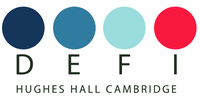MOOCs and Dialogue: A Great Pairing
Oct 10, 2024
2024
Registration for this event is now closed.
17:00 - 18:15
GMT+1
1728576000Do you create or are you interested in creating and facilitating online courses for Teacher Profe...
Do you create or are you interested in creating and facilitating online courses for Teacher Professional Development (TPD) which motivate and retain participants? Maybe you attended our previous webinar on 7th December 2023 which gave an overview of effective online and blended TPD? (recording available here)?
Now, DEFI and the Cambridge Educational Dialogue Research group (CEDiR) are delighted to present a webinar on technology-enhanced dialogue for TPD which continues the discussion from our last event. This online event will focus on MOOCs and the ways in which they can be designed and facilitated dialogically to enhance TPD.
Speakers include Dr Farah Ahmed, Meaghan Brugha, Dr Fereshte Goshtasbpour. Dr Kevin Martin will be acting as moderator.
Agenda
17
00
-
17
05
Introduction
Kevin Martin17
05
-
17
25
M is for Massive
Meaghan Brugha•Fereshte Goshtasbpour•Farah AhmedThe panel will discuss their perceptions and experiences of scale and size in relation to MOOCs.
Questions from the audience are welcome at anytime in the discussion
17
25
-
17
45
O is for Open
Farah Ahmed•Meaghan Brugha•Fereshte GoshtasbpourThe panel will discuss their experience of accessibility in terms of MOOCs.
Questions from the audience are welcome at any time.
17
45
-
18
00
O is for Online
Fereshte Goshtasbpour•Meaghan Brugha•Farah AhmedThe panel will share their experiences of digital barriers to being online and how to overcome them by engaging in online dialogue.
Questions are welcomed from the audience at any point.
18
00
-
18
15
C is for Course
Farah Ahmed•Meaghan Brugha•Fereshte Goshtasbpour•Kevin MartinThe panel will share their thoughts on what they consider to be a successful course for example: Is completion the only indicator of success? What about the voice of the inactive learner?
Audience views will be actively sought in this session.
Introduction
Speakers
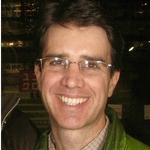
Kevin Martin
Managing Director of DEFI @ Hughes HallKevin Martin is the managing director of the Digital Education Futures Initiative (DEFI), at Hughes Hall, University of Cambridge, a translational research centre focused on technology in education. Kevin has spent 20 years at the intersection of social innovation and education, particularly on education and dialogue related initiatives in East Africa. Kevin also supports The International Small Group and Tree Planting Program (TIST), a deforestation program in East Africa and India, with education and technology related initiatives.
Kevin earned his PhD from the Faculty of Education, University of Cambridge, with his thesis titled Using Mobile Phones to Enhance Small Group Dialogic Learning: A Design Based Research Approach to Education Innovation in Rural East Africa. He has ongoing research interests in dialogic education, EdTech, and international development. Prior to undertaking his doctoral research, he was an Assistant Professor of Business Administration and an Associate Dean at New England College.
M is for Massive
The panel will discuss their perceptions and experiences of scale and size in relation to MOOCs. Questions from the audience are welcome at anytime in the discussion
Speakers

Meaghan Brugha
PhD candidate and Tech Industry veteran at Faculty of Education, University of CambridgeMeaghan Brugha will present and discuss findings from the 'Educational Dialogue Course Series', which she developed and trialled as part of her PhD research. These courses were created and offered as free mechanical MOOCs for teachers and teacher educators in schools and tertiary institutions globally. They supported participants in learning: (1) the foundational theories behind educational dialogue; (2) conducting a reflective inquiry into their practice regarding their use of educational dialogue; and (3) supporting their colleagues in developing their dialogic approaches.
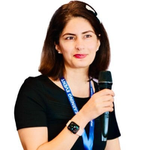
Fereshte Goshtasbpour
Lecturer in Digital Education at Institute of Educational Technology, Open University UKDr Fereshte Goshtasbpour is a lecturer in Digital Education and the co-lead for Computers and Learning Research Group (CALRG) and Learning@Scale SIG at the Institute of Educational Technology (IET), Open University UK. She has twelve years of experience as lecturer, researcher and course designer particularly at scale and has worked with partners in the Middle East, Africa, UK, and Europe. Her research focuses on learning and teaching in open and scaled online educational and professional contexts. More recently she has focused on digital health and wellness technology and in particular the data literacy users require to benefit from such technologies. She has contributed to several international projects as a researcher and co-investigator. For full profile, see https://iet.open.ac.uk/people/fereshte.goshtasbpour
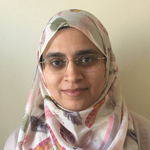
Farah Ahmed
Research Fellow at University of CambridgeDr Farah Ahmed is Leverhulme Early Career Research Fellow at the Faculty of Education, University of Cambridge. She is a steering group member of the Cambridge Educational Dialogue Research group, member of the T-SEDA Collective since 2015 and has been involved in the development, trial and translation of the toolkit and inquiry approach. Farah convenes the Cambridge Dialogues: Rethinking Islamic Education academic network. She is also the founding Director of the Islamic Educator Learning Community online professional development and research-exchange platform. She has published widely on Islamic philosophies of education, pedagogies and practices that draw on dialogic Islamic education theory, and how these might be integrated into contemporary schooling systems.
O is for Open
The panel will discuss their experience of accessibility in terms of MOOCs. Questions from the audience are welcome at any time.
Speakers

Farah Ahmed
Research Fellow at University of CambridgeDr Farah Ahmed is Leverhulme Early Career Research Fellow at the Faculty of Education, University of Cambridge. She is a steering group member of the Cambridge Educational Dialogue Research group, member of the T-SEDA Collective since 2015 and has been involved in the development, trial and translation of the toolkit and inquiry approach. Farah convenes the Cambridge Dialogues: Rethinking Islamic Education academic network. She is also the founding Director of the Islamic Educator Learning Community online professional development and research-exchange platform. She has published widely on Islamic philosophies of education, pedagogies and practices that draw on dialogic Islamic education theory, and how these might be integrated into contemporary schooling systems.

Meaghan Brugha
PhD candidate and Tech Industry veteran at Faculty of Education, University of CambridgeMeaghan Brugha will present and discuss findings from the 'Educational Dialogue Course Series', which she developed and trialled as part of her PhD research. These courses were created and offered as free mechanical MOOCs for teachers and teacher educators in schools and tertiary institutions globally. They supported participants in learning: (1) the foundational theories behind educational dialogue; (2) conducting a reflective inquiry into their practice regarding their use of educational dialogue; and (3) supporting their colleagues in developing their dialogic approaches.

Fereshte Goshtasbpour
Lecturer in Digital Education at Institute of Educational Technology, Open University UKDr Fereshte Goshtasbpour is a lecturer in Digital Education and the co-lead for Computers and Learning Research Group (CALRG) and Learning@Scale SIG at the Institute of Educational Technology (IET), Open University UK. She has twelve years of experience as lecturer, researcher and course designer particularly at scale and has worked with partners in the Middle East, Africa, UK, and Europe. Her research focuses on learning and teaching in open and scaled online educational and professional contexts. More recently she has focused on digital health and wellness technology and in particular the data literacy users require to benefit from such technologies. She has contributed to several international projects as a researcher and co-investigator. For full profile, see https://iet.open.ac.uk/people/fereshte.goshtasbpour
O is for Online
The panel will share their experiences of digital barriers to being online and how to overcome them by engaging in online dialogue. Questions are welcomed from the audience at any point.
Speakers

Fereshte Goshtasbpour
Lecturer in Digital Education at Institute of Educational Technology, Open University UKDr Fereshte Goshtasbpour is a lecturer in Digital Education and the co-lead for Computers and Learning Research Group (CALRG) and Learning@Scale SIG at the Institute of Educational Technology (IET), Open University UK. She has twelve years of experience as lecturer, researcher and course designer particularly at scale and has worked with partners in the Middle East, Africa, UK, and Europe. Her research focuses on learning and teaching in open and scaled online educational and professional contexts. More recently she has focused on digital health and wellness technology and in particular the data literacy users require to benefit from such technologies. She has contributed to several international projects as a researcher and co-investigator. For full profile, see https://iet.open.ac.uk/people/fereshte.goshtasbpour

Meaghan Brugha
PhD candidate and Tech Industry veteran at Faculty of Education, University of CambridgeMeaghan Brugha will present and discuss findings from the 'Educational Dialogue Course Series', which she developed and trialled as part of her PhD research. These courses were created and offered as free mechanical MOOCs for teachers and teacher educators in schools and tertiary institutions globally. They supported participants in learning: (1) the foundational theories behind educational dialogue; (2) conducting a reflective inquiry into their practice regarding their use of educational dialogue; and (3) supporting their colleagues in developing their dialogic approaches.

Farah Ahmed
Research Fellow at University of CambridgeDr Farah Ahmed is Leverhulme Early Career Research Fellow at the Faculty of Education, University of Cambridge. She is a steering group member of the Cambridge Educational Dialogue Research group, member of the T-SEDA Collective since 2015 and has been involved in the development, trial and translation of the toolkit and inquiry approach. Farah convenes the Cambridge Dialogues: Rethinking Islamic Education academic network. She is also the founding Director of the Islamic Educator Learning Community online professional development and research-exchange platform. She has published widely on Islamic philosophies of education, pedagogies and practices that draw on dialogic Islamic education theory, and how these might be integrated into contemporary schooling systems.
C is for Course
The panel will share their thoughts on what they consider to be a successful course for example: Is completion the only indicator of success? What about the voice of the inactive learner? Audience views will be actively sought in this session.
Speakers

Farah Ahmed
Research Fellow at University of CambridgeDr Farah Ahmed is Leverhulme Early Career Research Fellow at the Faculty of Education, University of Cambridge. She is a steering group member of the Cambridge Educational Dialogue Research group, member of the T-SEDA Collective since 2015 and has been involved in the development, trial and translation of the toolkit and inquiry approach. Farah convenes the Cambridge Dialogues: Rethinking Islamic Education academic network. She is also the founding Director of the Islamic Educator Learning Community online professional development and research-exchange platform. She has published widely on Islamic philosophies of education, pedagogies and practices that draw on dialogic Islamic education theory, and how these might be integrated into contemporary schooling systems.

Meaghan Brugha
PhD candidate and Tech Industry veteran at Faculty of Education, University of CambridgeMeaghan Brugha will present and discuss findings from the 'Educational Dialogue Course Series', which she developed and trialled as part of her PhD research. These courses were created and offered as free mechanical MOOCs for teachers and teacher educators in schools and tertiary institutions globally. They supported participants in learning: (1) the foundational theories behind educational dialogue; (2) conducting a reflective inquiry into their practice regarding their use of educational dialogue; and (3) supporting their colleagues in developing their dialogic approaches.

Fereshte Goshtasbpour
Lecturer in Digital Education at Institute of Educational Technology, Open University UKDr Fereshte Goshtasbpour is a lecturer in Digital Education and the co-lead for Computers and Learning Research Group (CALRG) and Learning@Scale SIG at the Institute of Educational Technology (IET), Open University UK. She has twelve years of experience as lecturer, researcher and course designer particularly at scale and has worked with partners in the Middle East, Africa, UK, and Europe. Her research focuses on learning and teaching in open and scaled online educational and professional contexts. More recently she has focused on digital health and wellness technology and in particular the data literacy users require to benefit from such technologies. She has contributed to several international projects as a researcher and co-investigator. For full profile, see https://iet.open.ac.uk/people/fereshte.goshtasbpour

Kevin Martin
Managing Director of DEFI @ Hughes HallKevin Martin is the managing director of the Digital Education Futures Initiative (DEFI), at Hughes Hall, University of Cambridge, a translational research centre focused on technology in education. Kevin has spent 20 years at the intersection of social innovation and education, particularly on education and dialogue related initiatives in East Africa. Kevin also supports The International Small Group and Tree Planting Program (TIST), a deforestation program in East Africa and India, with education and technology related initiatives.
Kevin earned his PhD from the Faculty of Education, University of Cambridge, with his thesis titled Using Mobile Phones to Enhance Small Group Dialogic Learning: A Design Based Research Approach to Education Innovation in Rural East Africa. He has ongoing research interests in dialogic education, EdTech, and international development. Prior to undertaking his doctoral research, he was an Assistant Professor of Business Administration and an Associate Dean at New England College.
Speakers

Meaghan Brugha
PhD candidate and Tech Industry veteran at Faculty of Education, University of Cambridge
More Information

Fereshte Goshtasbpour
Lecturer in Digital Education at Institute of Educational Technology, Open University UK
More Information

Farah Ahmed
Research Fellow at University of Cambridge
Dr Farah Ahmed is Leverhulme Early Career Research Fellow at the Faculty of Education, University of Cambridge. She is a steering group member of the Cambridge Educational Dialogue Research group, member of the T-SEDA Collective since 2015 and has been involved in the development, trial and translation of the toolkit and inquiry approach. Farah convenes the Cambridge Dialogues: Rethinking Islamic Education academic network. She is also the founding Director of the Islamic Educator Learning Community online professional development and research-exchange platform. She has published widely on Islamic philosophies of education, pedagogies and practices that draw on dialogic Islamic education theory, and how these might be integrated into contemporary schooling systems.

Meaghan
Brugha
PhD candidate and Tech Industry veteran at Faculty of Education, University of Cambridge
Meaghan Brugha will present and discuss findings from the 'Educational Dialogue Course Series', which she developed and trialled as part of her PhD research. These courses were created and offered as free mechanical MOOCs for teachers and teacher educators in schools and tertiary institutions globally. They supported participants in learning: (1) the foundational theories behind educational dialogue; (2) conducting a reflective inquiry into their practice regarding their use of educational dialogue; and (3) supporting their colleagues in developing their dialogic approaches.

Fereshte
Goshtasbpour
Lecturer in Digital Education at Institute of Educational Technology, Open University UK
https://iet.open.ac.uk/people/fereshte.goshtasbpourDr Fereshte Goshtasbpour is a lecturer in Digital Education and the co-lead for Computers and Learning Research Group (CALRG) and Learning@Scale SIG at the Institute of Educational Technology (IET), Open University UK. She has twelve years of experience as lecturer, researcher and course designer particularly at scale and has worked with partners in the Middle East, Africa, UK, and Europe. Her research focuses on learning and teaching in open and scaled online educational and professional contexts. More recently she has focused on digital health and wellness technology and in particular the data literacy users require to benefit from such technologies. She has contributed to several international projects as a researcher and co-investigator. For full profile, see https://iet.open.ac.uk/people/fereshte.goshtasbpour

Kevin Martin is the managing director of the Digital Education Futures Initiative (DEFI), at Hughes Hall, University of Cambridge, a translational research centre focused on technology in education. Kevin has spent 20 years at the intersection of social innovation and education, particularly on education and dialogue related initiatives in East Africa. Kevin also supports The International Small Group and Tree Planting Program (TIST), a deforestation program in East Africa and India, with education and technology related initiatives.
Kevin earned his PhD from the Faculty of Education, University of Cambridge, with his thesis titled Using Mobile Phones to Enhance Small Group Dialogic Learning: A Design Based Research Approach to Education Innovation in Rural East Africa. He has ongoing research interests in dialogic education, EdTech, and international development. Prior to undertaking his doctoral research, he was an Assistant Professor of Business Administration and an Associate Dean at New England College.
Sponsors and Partners
Organizer
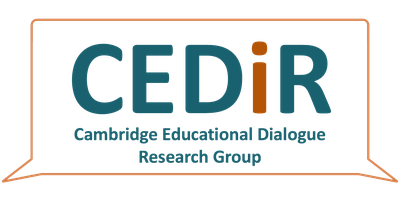
Cambridge Educational Dialogue Research Group
Cambridge Educational Dialogue Research Group (CEDiR) is based in the Faculty of Education, University of Cambridge. CEDiR members explore educational dialogue through four main strands: 1) classroom interaction, 2) dialogue in and around digital tools, 3) professional dialogue, and 4) dialogue in different religious and cultural traditions . For further information or to join their mailing list go to https://www.educ.cam.ac.uk/research/groups/cedir/
https://www.educ.cam.ac.uk/research/groups/cedir/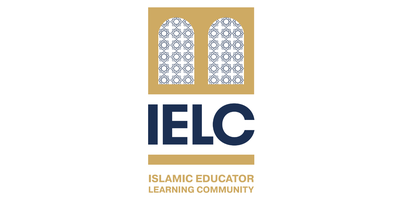
Islamic Educator Learning Community (IELC)
IELC is a new learning community of Islamic educators (anyone working in or teaching Muslim learners aged from 3-18 years). IELC is an online platform hosted by Camtree and is designed to facilitate exchange between Islamic scholarship, educational research and Islamic educational settings.
IELC supports teachers and educators to engage in reflective practice and conduct their own classroom research inquiries, in order to improve learning. We draw on the wider content of Camtree and also provide our own context specific platform and content.
IELC is now open for registrations! Sign up now to receive our regular newsletter and other updates from IELC and Camtree.
This is a past event
Digital Education Futures Initiative might have other events you're interested in.
View more events
